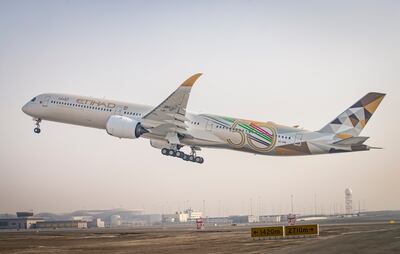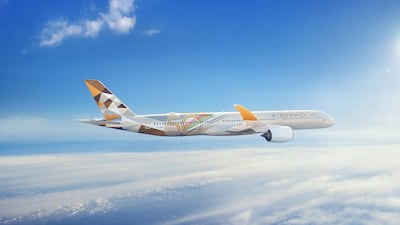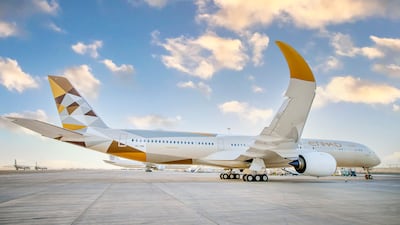Etihad Airways swung to a record profit in the first half of 2022 — the highest in its 18-year history — citing a strong rebound in passenger travel demand, growth in cargo revenue and lifting of domestic Covid-19 curbs.
The Abu Dhabi-based airline returned to the black with a core operating profit of $296 million in the first six months of this year, compared to a half-year loss of $392m in 2021, buoyed by a four-fold increase in the number of passengers carried during the period, Etihad Airways said on Thursday.
Ancillary revenue, cost management, lower debt and an "agile" business model developed during a five-year restructuring programme also helped lift the airline's six-month profit and other financial metrics to historic levels.
"It's great to be here on the back of a really good quarter four last year and six outstanding, record-breaking months for us," Adam Boukadida, Etihad Airways' chief financial officer, told The National.
"The increase in passenger numbers and yield continues to be positive, revenge travel is growing globally and there's no sign of this slowing."
"It's been four-and-half years of transformation, with an agile model, hard teamwork and grit... we're a one-off case study in the best possible way and we've earned our grey hair."
Etihad Airways has forged ahead with a five-year restructuring programme that transformed it into a medium-sized airline as it reduced its fleet, network and workforce.
The airline took further steps to reduce costs and preserve cashflow during the pandemic. This, together with its transformation programme, helped the company to deal with the global crisis and paid off with historic earnings, it said.
State-owned Etihad Airways carried 4.02 million passengers in the first half of 2022, more than quadrupling the 980,000 passengers flown in the same period last year. The average number of seats filled rose 21.9 percentage points year-on-year to 75 per cent as demand recovered and Abu Dhabi further relaxed pandemic-related restrictions.
This tripled passenger revenue in the first six months of the year to $1.25 billion as more leisure and business travellers took to the skies and more countries across Etihad's network relaxed their Covid-related travel restrictions.
The airline's earnings before interest, taxes, depreciation, and amortisation (Ebitda), a measure of a company’s overall financial performance, improved to $691m.
Air cargo business remained strong with a six per cent year-on-year rise in revenue to $802m in the first half of the year, while freight volumes fell 19 per cent to 295,020 tonnes as higher passenger volumes limited belly-hold capacity, Etihad said.
Etihad's positive earnings came despite its fuel costs increasing nearly 60 per cent from the first half of 2021 as oil prices surged. The airline hedges for 25 per cent of its fuel requirements for 2022, Mr Boukadida said.
Fuel makes up 35 per cent of the airline's total costs, the CFO said.
However, the airline kept tight control of its costs. It reduced fixed overhead and finance costs in the first half of 2022 by nine per cent (or $29m) and 13 per cent (or $22m) respectively.
Operating costs rose by 26 per cent, as the airline ramped up operations to meet demand and increased capacity by 46 per cent, it said. It operated 71 aircraft during the six-month period, up from 64 jets in the first half of 2021.

Outlook for 2022
Mr Boukadida touted the possibility of the airline posting an annual profit in 2022, one year ahead of schedule, depending on market conditions.
"We expect full-year profit, and other positive financial metrics, however things can change overnight," he said.
The third quarter is "extremely good" and the fourth quarter is also projected to be "good" as the UAE prepares to hosts global events such as the UFC and the Formula One race, he added.
In July, Etihad's load factors (a measure of how well an airline fills its available seats) are on track to reach about 87 to 88 per cent for the month, he said.
August load factors are currently projected to reach 88 to 90 per cent.
Have airfare increases reached their peak?
Etihad, which operates 39 Boeing 787s and has 11 more on order, expects to take delivery of some Dreamliner jets in "the back-end of 2023," Mr Boukadida said, though the exact number has yet to be determined.
Boeing has suspended deliveries of the jet model globally amid continuing production issues.
Etihad, which signed a letter of intent for seven Airbus A350 freighters, expects that contract to become firm "soon", he said, without providing an exact date.
The airline, which had grounded its A380 superjumbos during the pandemic, is exploring returning the four-engine aircraft to the skies but it is "too early" to make a decision as oil prices remain high.
Oil prices of $65 to $80 could justify the double-decker's return to the fleet, though the decision depends on other key variables such as travel demand, capacity and ticket prices, he said.
Asked if the airline industry's rising air fares have reached their peak this summer, Mr Boukadida said: "With demand where it is, and with limited capacity to deploy, it may not be the end of the price increases."
Maintaining momentum
Tony Douglas, Etihad Aviation Group's chief executive, said the airline is "emerging from the pandemic stronger than ever".
"Our focus now is on continuing this momentum into the second half of the year," Mr Douglas said.








